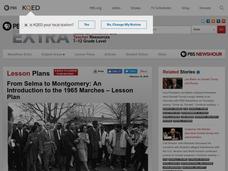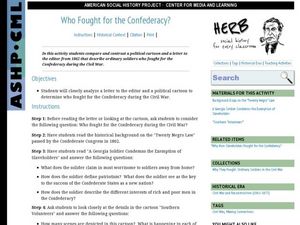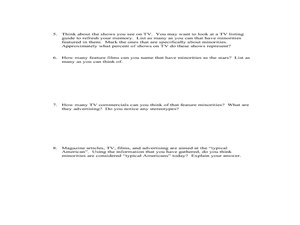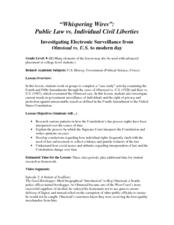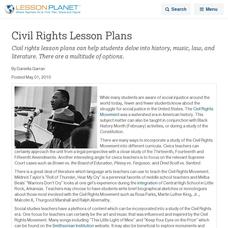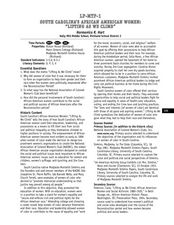Center for History and New Media
The Impact of the Jim Crow Era on Education, 1877–1930s
Even though American slaves were officially emancipated in 1865, the effects of slavery perpetuated throughout the 19th and 20th centuries. Middle and high schoolers learn about the ways that discrimination and the Jim Crow laws...
PBS
From Selma to Montgomery: An Introduction to the 1965 Marches
The 1965 Civil Rights marches from Selma to Montgomery and the resulting Voting Rights Act of 1965 are the focus of a social studies lesson. The resource uses film clips to inform viewers not only about the discrimination that gave rise...
Atlanta History Center
What if YOU Lived During Jim Crow?
Young historians envision what life was like for African Americans living in the Jim Crow South through hands-on, experiential activities.
Curated OER
1856-1865: Abolitionists and the Civil War
Students explore the concept of philanthropy. In this abolition instructional activity, students watch "Uncle Tom's Cabin" and discuss the philanthropic acts they witnessed in the film. Students also complete an activity that requires...
University of California
The Civil War: Secession of the South
Was the Southern states' decision to secede from the Union protected by the United States Constitution? Eighth graders discuss the constitutionality of the South's justification for secession, particularly the secession of South...
Facing History and Ourselves
Life for German Youth in the 1930s: Education, Propaganda, Conformity, and Obedience
The German youth faced an onslaught of propaganda when they went to school, thanks to the Nazi regime led by Hitler during World War II. Pupils relate their education experiences to German youth by analyzing primary source readings,...
Curated OER
Who Fought for the Confederacy?
Did the Confederate Army really consist of southern volunteers? Using primary sources, historians examine the story behind the "Twenty Negro Law" and realities of conscription during the Civil War. A letter and a lithograph (included as...
Curated OER
Minorities in Mainstream American Society
So many people fought for Civil Rights in the United States. Read about the Civil Rights Act of 1964, and discuss what the act guarantees. Then pass out a slew of magazines and encourage them to observe how often minorities appear in...
Curated OER
Claudette Colvin: Twice Toward Justice
Use the historical account of Claudette Colvin to study civil rights and connect past injustices to modern issues. As learners read, they examine chapter titles, record quotes, and participate in discussion. Next, they research active...
Curated OER
Rosa Parks Changed the Rules
Students complete a diagram of the Montgomery bus that carried Rosa Parks into the history books. They read about Rosa Park's contributions to the Civil Rights movement. They role play Rosa Park's refusal to move to the back of the bus.
University of Arkansas
Promises Denied
"Promises Denied," the second instructional activity in a unit that asks learners to consider the responsibilities individuals have to uphold human rights, looks at documents that illustrate the difficulty the US has had trying to live...
Curated OER
Jim Crow Lesson Plan
Jackie Robinson's attempt to earn a spot on the 1946 Brooklyn Dodgers provides learners with an opportunity to examine the Jim Crow laws and revisit issues of segregation and integration. "The Unconquerable Doing the Impossible: Jackie...
Student Handouts
Voting Rights Speech Before Congress
Is your class studying civil rights? Consider taking a look at President Lyndon B. Johnson's voting rights speech. This resource includes an abridged version and three related questions. Pupils consider Johnson's use of language and the...
Curated OER
Who Knows? Your Privacy in the Information Age
Teach young adults how to become advocates for their privacy in the modern information age. In a series of five lessons, learners explore their beliefs and opinions about privacy vs. the actual laws regarding who has the right to access...
Curated OER
"Whispering Wires": Public Law vs. Individual Civil Liberties
High school student love discussing controversial issues like those brought up in this fourth amendment case study. They examine the 1928 Olmstead vs. U.S. prohibition court case, applying the fourth amendment to determine whether or not...
Curated OER
Civil Rights Lesson Plans
Civil rights lesson plans can help students delve into history, music, law, and literature. There are a multitude of options.
Judicial Learning Center
The Judge and the Jury
Unless you are a lawyer, you might not understand just how unrealistic Law and Order and other legal dramas actually are. Here's a great resource to help scholars of criminology gain a more realistic perspective. The lesson outlines the...
Judicial Learning Center
Why Study Landmark Cases?
Why study landmark Supreme court cases? A helpful lesson offers a brief but valuable argument for the importance of these cases in the field of criminology. It introduces scholars to some key terms necessary for studying court cases and...
Curated OER
Lesson 5: In the Courtroom: Understanding the Players and the Action
Young lawyers put Goldilocks on trial as they develop an understanding of the legal system in the final lesson of this five-part series. After learning about key terms relating to litigation, students are assigned roles and reading...
DocsTeach
Confronting Work Place Discrimination on the World War II Home Front
Before the Civil Rights Movement was in full swing, FDR's executive order helped promote fair employment. The activity uses primary documents to explore FDR's executive order to help minorities gain equal employment and pay during the...
DocsTeach
Alfred Sinker and the Writ of Habeas Corpus in 1861
Scholars learn how the judicial system treated under-age Civil War soldiers using historical analysis. The resource uses court documents to help historians understand why Habeas Corpus was used in the case of Alfred Sinker and why he was...
Curated OER
South Carolina's African American Women: "Lifting As We Climb"
Students explore the formation of the National Association of colored Women's Club. In this civil rights lesson, students research the history and mission of the NACWC.
Curated OER
Civil War Music
Students discover how both the North and South used music extensively during the Civil War to rally troops, as recreation, to march by, and many other reasons. They realize that both sides would borrow each other's tunes or lyrics and it...
Curated OER
Unsung Heroes of the Civil Rights Movement
Students analyze historic rulings that played roles in the Civil Rights Movement. In this civil right lesson, students research Internet and print sources regarding Plessy v. Ferguson, Sipuel v. Board of Regents of the University of...



